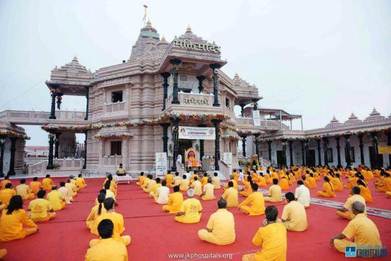The literal translation of sadhana bhakti is preparatory devotion. Mind, the doer of all actions, is attracted to the material Sansaar-The World since eternity; hence pursues it for finding eternal bliss. One needs to divert the mind from pursuing material matters to pursuing God. This is the beginning stage of devotion. The purpose of this preparatory devotion is to remove the attraction of all material objects from the mind.
This stage of devotion can be divided into two stages
This stage of devotion can be divided into two stages

The word sadhana means practice. This is the elementary level in which a seeker learns how to focus on the divine form of Shri Krishna and starts practicing it. Focusing on the divine form is called roopdhyan - devotional remembrance.
Following the instructions of a rasik saint, when the seeker sincerely practices roopdhyan, he gradually reaches the higher states where he becomes more sincere and practices regularly. The seeker starts to experience an ecstasy which increases day by day. With prolonged practice, doing roopdhyan becomes increasingly easier, ultimately it becomes so easy that no ups or downs in life can hamper his sadhana. This is the start of the next level of preliminary devotion, which is called Bhav Bhakti.
Following the instructions of a rasik saint, when the seeker sincerely practices roopdhyan, he gradually reaches the higher states where he becomes more sincere and practices regularly. The seeker starts to experience an ecstasy which increases day by day. With prolonged practice, doing roopdhyan becomes increasingly easier, ultimately it becomes so easy that no ups or downs in life can hamper his sadhana. This is the start of the next level of preliminary devotion, which is called Bhav Bhakti.

This is the higher stage of preliminary devotion, wherein the practitioner can do roopdhyan in all places, at all times and in all situations. At this stage of bhakti the aspirant starts experiencing the fruits of devotion: satisfaction, detachment, humility etc. At the zenith of bhav-bhakti every material desire is replaced with an intense desire to meet the Lord. The devotee feels as if he will die if he does not meet God “right now!”.
An aspirant realizes God after attaining perfection in Bhav Bhakti. It is important to know the symptoms of Bhav Bhakti in order to introspect and determine one’s progress on the spiritual path. Otherwise, a little progress in devotion may create a misconception of having attained Bhav Bhakti. This false pride could become a cause of his utter downfall from his current spiritual status.
An aspirant realizes God after attaining perfection in Bhav Bhakti. It is important to know the symptoms of Bhav Bhakti in order to introspect and determine one’s progress on the spiritual path. Otherwise, a little progress in devotion may create a misconception of having attained Bhav Bhakti. This false pride could become a cause of his utter downfall from his current spiritual status.
Bhakti Rasamrit Sindhu is the most significant scripture of bhakti. In that book the following are described as the symptoms of Bhav Bhakti.
क्षांतिरव्यर्थ कालत्वं विरक्तिर्मानशून्यता, आशाबंधः समुत्कण्ठा नामगाने सदा रुचिः ।
आसक्तिस्तद्गुणाख्याने प्रीतिस्तद्वसतिस्थले, इत्यादयोऽनुभावास्युर्जातभावाड्कुरे जने ॥
आसक्तिस्तद्गुणाख्याने प्रीतिस्तद्वसतिस्थले, इत्यादयोऽनुभावास्युर्जातभावाड्कुरे जने ॥
भ. र. सि.
kṣāṃtiravyartha kālatvaṃ viraktirmānaśūnyatā, āśābaṃdhaḥ samutkaṇṭhā nāmagāne sadā ruciḥ ।
āsaktistadguṇākhyāne prītistadvasatisthale, ityādayo'nubhāvāsyurjātabhāvāḍkure jane ॥
āsaktistadguṇākhyāne prītistadvasatisthale, ityādayo'nubhāvāsyurjātabhāvāḍkure jane ॥
bha. ra. si.
Chhanti
1. Chhanti (क्षांति) - Chhanti means tranquility. In Ujjwal Neelmani, another scripture of bhakti, this state is defined as
क्षोभहेतावपिप्राप्ते क्षान्तिरक्षुभितात्मना । उ. नील.
kṣobhahetāvapiprāpte kṣāntirakṣubhitātmanā । u. nīla.
kṣobhahetāvapiprāpte kṣāntirakṣubhitātmanā । u. nīla.
“(When one reaches this state) even if there is a genuine reason for anxiety the person remains calm and tranquil”. For example, if one’s whole family and wealth is annihilated in a split second yet he does not loose his cool and levelheadedness, then the person is said to have attained chhanti.
Avyarth Kalattvam
2. Avyarth Kalattvam (अव्यर्थकालत्वं) - the aspirant feels every moment spent without loving remembrance of God is a waste of time.
Virakti
3. Virakti (विरक्ति) - the seeker does not have to desist from sensual pleasures rather he has natural disinclination for enjoying the objects of sensual pleasure.
विरक्तिरिन्द्रियर्थानंस्यदरोचकता स्वयम्।
viraktirindriyarthānaṃsyadarocakatā svayam।
viraktirindriyarthānaṃsyadarocakatā svayam।
Maan-shoonyata
4. Maan-shoonyata (मानशून्यता) - The seeker genuinely respects others but has no desire of being respected by anyone.
Aasha
5. Aasha (आशा) - In this state the seeker has an unwavering positive attitude and firm belief that he will attain divine grace of Shri Krishna and will get to behold His divine vision.
Samudkantha
6. Samudkantha (समुत्कण्ठा) - The seeker has an ever-increasing eagerness to see God. Also, he has a firm faith that Shri Krishna is about to appear in front of me. Even the sound of a leaf rustling startles him thinking probably my Beloved has come.
Naam gaan mein ruchi
7. Naam gaan mein ruchi (नामगान में रुचि) - The seeker can’t help but continually chant the sweet names of God. Yet, in spite of continuously singing the names he never feels contented and wants to sing even more.
Gun gaan
8. Gungaan (गुणगान) - This aspirant has in insatiable thirst for the glories of Shyam Sundar. In spite of narrating and listening to the divine ecstatic pastimes day and night, the seeker’s thirst for more doesn’t abate.
Leela sthal prem
9. Leela sthal prem (लीलास्थल-प्रेम) - It is spiritually exhilarating for the aspirant to experience the places where his Lord had performed pastimes. He loves to live in those places, visit those places, touch the things his Lord might have touched and smell the flowers that his Lord might have smelt.
When a seeker practices devotion under the divine guidance of an authentic saint, the saint graces the seeker which causes these symptoms gradually to sprout and get stronger. Since these are bestowed as a divine gift (कृपा साध्य), accepting guardianship of a divine spiritual master or Guru is imperative.
Please Note: No amount of penance or devotional practice can give rise to these symptoms. Accepting guardianship of a genuine saint is vital to grow in the path of devotion.
When a seeker practices devotion under the divine guidance of an authentic saint, the saint graces the seeker which causes these symptoms gradually to sprout and get stronger. Since these are bestowed as a divine gift (कृपा साध्य), accepting guardianship of a divine spiritual master or Guru is imperative.
Please Note: No amount of penance or devotional practice can give rise to these symptoms. Accepting guardianship of a genuine saint is vital to grow in the path of devotion.






